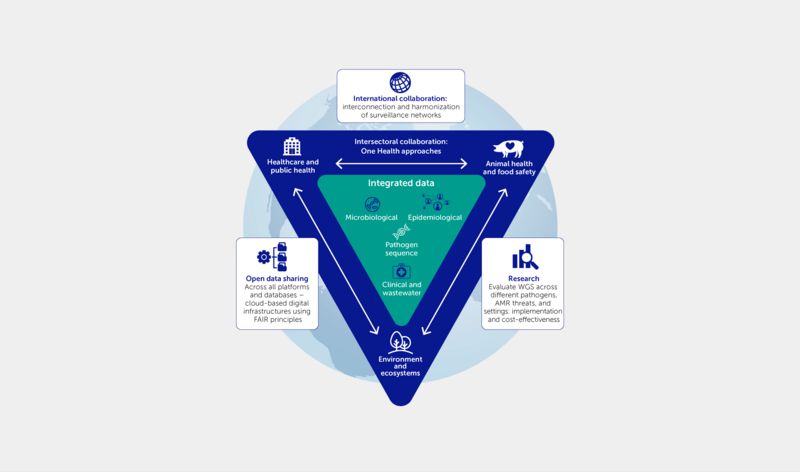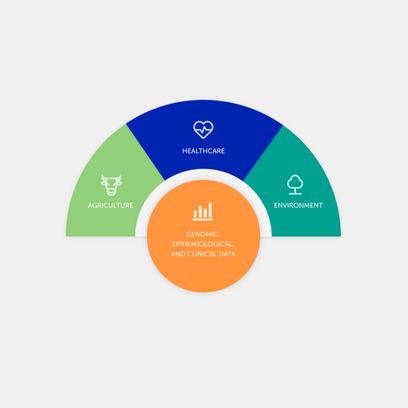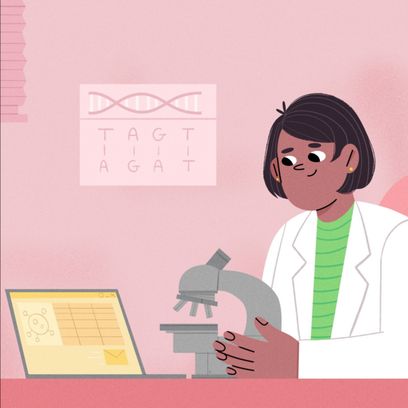
Frontiers in Science Lead Article
Published on 25 Apr 2024
Real-time genomic surveillance for enhanced control of infectious diseases and antimicrobial resistance
- 109,192 views
- 56 citations


Frontiers in Science Lead Article
Published on 25 Apr 2024

Experts explored next steps for real-time, global genomic surveillance of pathogens at a Frontiers Forum Deep Dive session on 5 June 2024.

Efforts to build integrated, systematic, collaborative disease surveillance worldwide must prioritize equity, true One Health approaches, genomic and phenotyping capacity, and open data sharing, argues Prof Marion P.G. Koopmans of the Erasmus Medical Center, Netherlands.

Genomic sequence analysis should be adopted because it provides four types of pathogen “intel”—epidemiological, clinical, epidemic, and biological—to help fight infectious diseases, outlines Prof David M. Engelthaler of the Translational Genomics Research Institute, USA.

Pathogen surveillance needs support from healthcare and biomanufacturing infrastructure to investigate the cause of syndromic clusters and develop clinical responses, recommend Dr Michael A. Crone and Prof Paul S. Freemont of Imperial College London, UK.

Capacity, access, data quality, and ethical issues must be addressed for global adoption of genomic surveillance, highlight Dr Stephen A. Morse of IHRC Inc, USA, and Dr Segaran P. Pillai of the United States Department of Health and Human Services.

Submissions open: This Research Topic in Frontiers in Public Health welcomes manuscripts on solutions for enabling the transformative potential of real-time genomic surveillance in public health and assessing its real-world impact across settings.
Insights gained from the systemic use of whole genome sequencing (WGS) to monitor novel variants of SARS-CoV-2 during the COVID-19 pandemic have accelerated the wider integration of WGS for infectious disease and antimicrobial resistance (AMR) surveillance and a One Health approach to inform prevention and control strategies, including vaccination.
Pandemic preparedness requires worldwide deployment of agile integrated genomic, clinical, and epidemiologic surveillance systems with seamless interoperability and global interconnectivity—allowing real-time monitoring of the emergence, spread, virulence, and evolution of pathogens, using a One Health perspective.
One Health genomic surveillance requires wider cross-sectorial collaboration and data sharing in line with ethical regulations, between laboratories, health agencies, surveillance databases, and the broader scientific community—using FAIR principles regarding findability, accessibility, interoperability, and reusability.
International harmonization of methods and nomenclature for genomic surveillance as well as support for timely data sharing are key steps to enable coordinated global responses to cross-border threats from infectious diseases and AMR.
Continued investment to enhance laboratory capacity, provide access to validated genomic data analytical tools, train an expert workforce (including health professionals), and achieve a comprehensive digital health information infrastructure must address international resource inequalities to ensure universal access.
Academic, public health, and non-governmental organizations should share best practices to advance the equitable deployment of pathogen genomics through collaborative initiatives at regional and global levels.

A summary of the lead article in a Q&A format, with infographics and a video.

A version of the lead article written for—and peer reviewed by—kids aged 8-15 years.

Scientists champion global genomic surveillance using latest technologies and a “One Health” approach to protect against novel pathogens like avian influenza and antimicrobial resistance, catching epidemics before they start.

Real-time genomic surveillance, which uses sequencing to analyse the genetic material of pathogens, could prevent the next pandemic, a new study says.

The Covid-19 pandemic turned the world upside down. In fighting it, one of our most important weapons was genomic surveillance, based on whole genome sequencing, which collects all the genetic data of a given microorganism.

Experts have called for genomic surveillance to be mobilized to stave off worldwide threats to health from infectious diseases and antimicrobial resistance.

Microbiology experts are calling for the establishment of a global genomic surveillance system, "One Health", to prevent epidemics before they start. They publish in Frontiers in Science.
Follow the science, follow Frontiers in Science